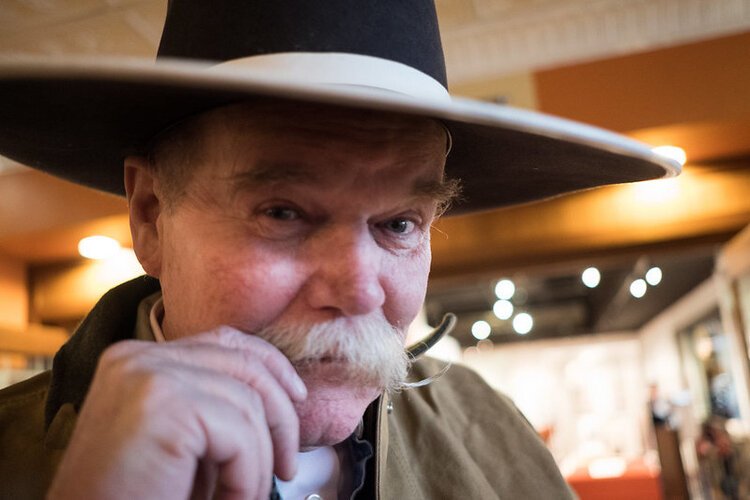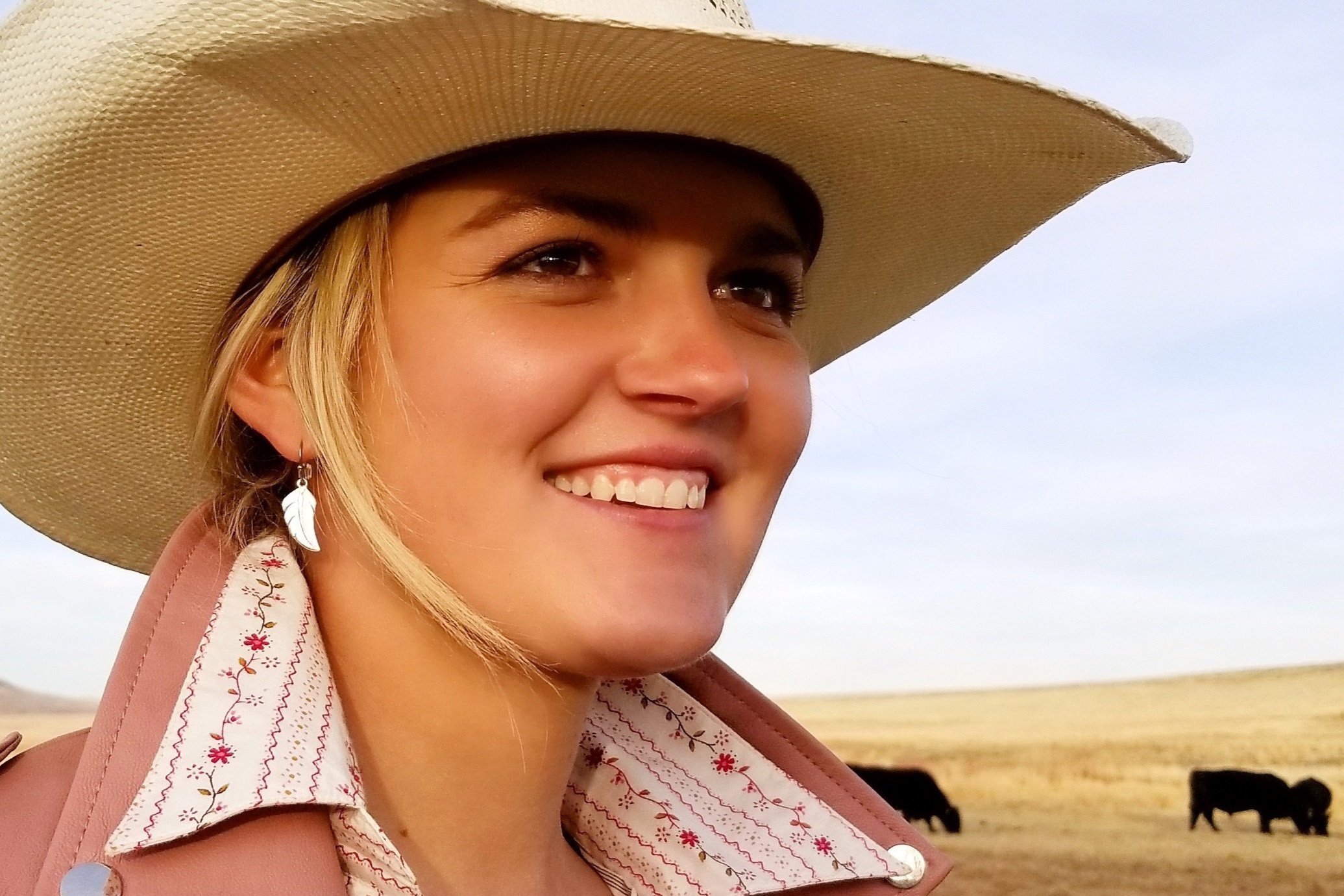Got a Question? Ask A COWBOY POET!
June 2024
This month, the poets are asked a question by another poet:
“When inspiration strikes, don’t hesitate to write.”
I share this phrase with anyone who asks me about poetry or writing in general. Still, there are times when inspiration strikes and the usual tools for recording an idea are not available. What is the silliest, strangest, or otherwise most unconventional way you’ve managed to record a poem before it escaped your consciousness? What were the circumstances that forced you to employ such extraordinary measures?
~ Jonathan Odermann
dw groethe:
I have carried a small notebook and pen with me since high school. Always. So, when a poem or song comes to me, I scribble it down quick. My personal theory is that when the muse comes with an offering it'll give you two minutes or less to do something with it. If you don't, it gets passed on to somebody else. So, I get busy writing. However, there was a time, before cell phones, when a melody would hit me and I would have to find a phone, call my answering machine, and sing into it. That way, when I got back home, I could sit down, listen, and put it together on the guitar. Then I'd have it. Hope that's helpful...and,
Thanks for asking,
dw
waddie mitchell:
For most of my adult life, I've slept with a pad and pencil near the bed so I could write down ideas that sometimes come to me in the night. Every once in a while, those thoughts actually become a poem, but not often. The pencil and pad have now been replaced with an iPad. Its purpose is the same. I don't believe this is an uncommon thing to do among writers—in fact, once, a small group of us were backstage talking about this very subject. One well-known writer said he always carries a pen and pad for that same reason. He said thoughts come any time of the day and are as easily lost in the daytime as those that come at night. That got me thinking. I started carrying a pen and paper in my shirt pocket. Well, short story longer, in time I didn't worry about it like I maybe should have and would go days or all week without paper to write on.
One day, a line came that was too good not to write down. I had not brought paper but did have a pen. I took my handkerchief, laid it flat over my chap leg, and tediously wrote the line I wanted to keep. As the day went along that line started calling other lines and ideas. I wrote them all on that nose rag. All these thoughts and rhymes and ideas were hard to write on thin material and leather. That all made it quite a labor of love for my art. Done for the day, I was anxious to get this poem transferred from hanky to paper. In the house, I told the family I had written a poem that day that I was happy with, I just had to put it together. I pulled my do-cloth from my hip pocket and spread it on the table. The prompts and lines had not come in order. The penmanship was horrid due to the sharp pen, thin, loosely woven cloth, poor writing surface, and hurried needs of the day. It was a long and difficult job, but I did get a little poem out of it.
My writing nowadays starts and stops at my desk.
dick gibford:
One time I had to scribble some lines along the length of my left arm with an ink pen. It worked well enough to preserve the beginning of a poem that I have recited for years now. I was horseback, of course, but did have some pens in a pocket of my vest. I usually have a small tablet of note paper on me as well, but not that time. Usually it's sufficient to jot down the opening lines to an idea for a poem and the rest will come quite easily when I get back to camp and get the coffee brewed! I reckon the world would be temporarily paralyzed if we all ran out of coffee!
Yvonne hollenbeck:
When inspiration strikes, I have to write. I learned a long time ago that you will not remember the inspiration, even for a short while, unless you at least scribble down some notes. I always try to have a pencil handy and something to write on. Pens don’t always work, you know. I have these two items on my night stand, in the bathroom, kitchen, sewing room, or wherever I spend time. There are always circumstances where one is indeed forced to employ extraordinary measures, such as when I wrote the poem “The Ranch Rig.” As usual, I had been sweet-talked into riding along to check pastures (so I could open the gates). My husband discovered a broken pump stick on a windmill, so he was working on it. Now, his old 1990 Dodge pickup is quite unsightly and the inside is a total disaster. I decided to jot down what I was seeing in the cab of that junker, as I thought it might make a good poem. I did not have a pencil handy, but found an ear tag marker and retrieved an empty salt sack from the back end and went to writing.
bill lowman:
I don’t force it. I’m not under contract to write a poem. If it stalls halfway through and the inspiration and ideas “lock up,” I walk away from it—I’ve got other things to do. I’m a very busy person. If the inspiration surfaces in the future, it gets finished. If not, it doesn’t. I don’t write a poem just to write a poem—it has to have a reason to exist. I, along with most every veteran poet that I’m acquainted with, have a desk drawer half full of unfinished poems that “lost their way.” It’s important to know when you, yourself, functions best. I’m at my best in the “hour of the wolf.” I’m an extremely early riser. That’s my time of day. It’s a constant fresh, new start of the rest of my life. All is fresh and new and real. My pets, livestock, wildlife, and nature are unspoiled by human intrusion. My mind is alert and busy, thoughts and poems write themselves. On the downside, evenings are a disaster to try and write. I’m physically and mentally “bushed.” I’ll just make quick notes of a thought then and leave it alone for a new day. I know others that do their best late into the night, but they’re always up by the “crack of noon” the next day.
annie mackenzie:
I've written them on envelopes, sticky notes, receipts, napkins, Copenhagen cans, and just about anything that will take ink. I try to get them scribbled down quick so I don't forget them. Only problem is that it is quite literally a scribble, and I can't read my own writing a lot of the time. Usually takes quite a bit of deciphering to figure out what the heck I wrote!









